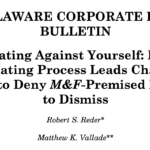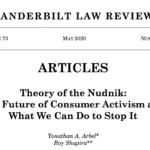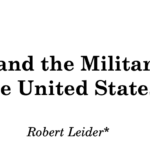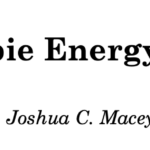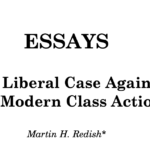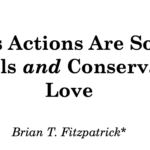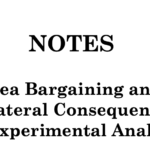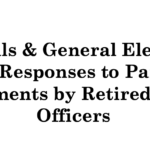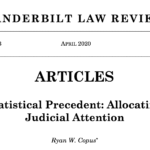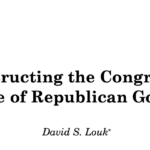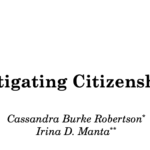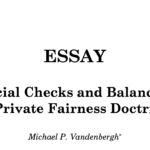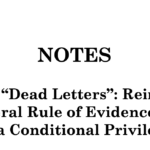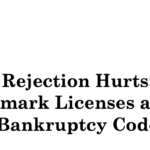Author
Negotiating Against Yourself: Flawed Negotiating Process Leads Chancery Court to Deny M&F-Premised Motion to Dismiss
Sep. 22, 2020—Robert S. Reder & Matthew K. Vallade | 73 Vand. L. Rev. En Banc 213 (2020) | “In Alon USA, a target company minority stockholder challenged a transaction where a stockholder owning ‘48% [of the] equity interest’ in the target purchased the remainder of the outstanding stock via a merger transaction. In sorting out this...
Theory of the Nudnik: The Future of Consumer Activism and What We Can Do to Stop It
May. 26, 2020—Yonathan A. Arbel & Roy Shapira | 73 Vand. L. Rev. 929 (2020) | How do consumers hold sellers accountable and enforce market norms? This Article contributes to our understanding of consumer markets in three ways. First, the Article identifies the role of a small subset of consumers—the titular “nudniks”—as engines of market discipline. Nudniks...
Federalism and the Military Power of the United States
May. 26, 2020—Robert Leider | 73 Vand. L. Rev. 989 (2020) | This Article examines the original meaning of the constitutional provisions governing the raising and organization of military forces. It argues that the Framers carefully divided the military between the federal and state governments. This division provided structural checks against the misuse of military power and...
Zombie Energy Laws
May. 26, 2020—Joshua C. Macey | 73 Vand. L. Rev. 1077 (2020) | This Article traces the development of three legal rules—cost recovery for vertically integrated utilities, the requirement that regulators assess the financial viability of energy projects before issuing a certificate of public convenience and necessity, and the filed rate doctrine—that emerged out of the view...
The Liberal Case Against the Modern Class Action
May. 26, 2020—Martin H. Redish | 73 Vand. L. Rev. 1127 (2020) | Those who classify themselves as liberal generally favor widespread use of class actions as a means of policing corporate misbehavior and protecting the individual worker or consumer against capitalist excesses. In this Essay, however, I take the counterintuitive position that while class action practice...
Why Class Actions Are Something both Liberals and Conservatives Can Love
May. 26, 2020—Brian T. Fitzpatrick | 73 Vand. L. Rev. 1147 (2020) | In Professor Redish’s review of my new book, The Conservative Case for Class Actions, he argues that liberals should oppose the class action because the cy pres doctrine used to distribute settlement money is democratically illegitimate and that conservatives should oppose it because it...
Plea Bargaining and Collateral Consequences: An Experimental Analysis
May. 26, 2020—Carlie Malone | 73 Vand. L. Rev. 1161 (2020) | The overwhelming majority of convictions in the United States are obtained through guilty pleas. Many of these guilty pleas are a product of plea bargaining, where a defendant enters a guilty plea in exchange for some form of official concessions. Despite its prominence, plea bargaining...
Generals & General Elections: Legal Responses to Partisan Endorsements by Retired Military Officers
May. 26, 2020—Hannah Martins Miller | 73 Vand. L. Rev. 1209 (2020) | Retired generals and admirals of the U.S. military appear to be endorsing partisan political candidates in greater numbers, with more visibility. This Note argues that the practice represents a clear danger to civilian control over the military and weakens military effectiveness. It explains that while...
Statistical Precedent: Allocating Judicial Attention
Apr. 20, 2020—Ryan W. Copus | 73 Vand. L. Rev. 605 | Suffering from a well-covered “crisis of volume,” the U.S. Courts of Appeals have patched together an ad hoc system of triage in an effort to provide cases with sufficient attention. For example, only some cases are assigned to central staff, analyzed by law clerks, orally...
Reconstructing the Congressional Guarantee of Republican Government
Apr. 20, 2020—David S. Louk | 73 Vand. L. Rev. 673 | The Republican Guarantee Clause of Article IV, Section 4 promises that “[t]he United States shall guarantee to every State in this Union a Republican Form of Government.” Although this clause might seem to confer significant power to oversee the political structures of the states, ambiguity...
Litigating Citizenship
Apr. 20, 2020—Cassandra Burke Robertson & Irina D. Manta | 73 Vand. L. Rev. 757 | By what standard of proof—and by what procedures—can the U.S. government challenge citizenship status? That question has taken on greater urgency in recent years. News reports discuss cases of individuals whose passports were suddenly denied, even after the government had previously...
Social Checks and Balances: A Private Fairness Doctrine
Apr. 20, 2020—Michael P. Vandenbergh | 73 Vand. L. Rev. 811 | This Essay proposes a private standards and certification system to induce media firms to provide more complete and accurate information. It argues that this new private governance system is a viable response to the channelized flow of information that is exacerbating political polarization in the...
Reviving “Dead Letters”: Reimagining Federal Rule of Evidence 410 as a Conditional Privilege
Apr. 20, 2020—Peter G. Cornick | 73 Vand. L. Rev. 857 | Though understudied relative to its fellow specialized relevance rules, Federal Rule of Evidence 410 protects a crucial element of the criminal justice system: plea negotiations. As written, the rule prevents the admission of evidence gathered during plea discussions, which helps assure criminal defendants that their candid...
Rejection Hurts: Trademark Licenses and the Bankruptcy Code
Apr. 20, 2020—Amanda E. James | 73 Vand. L. Rev. 889 | Section 365 of the Bankruptcy Code empowers debtors to reject burdensome executory contracts. From 1988 until May 2019, the effect of such a rejection on trademark licenses was unclear. The Supreme Court’s recent decision in Mission Product Holdings, Inc. v. Tempnology, LLC settled the matter...
